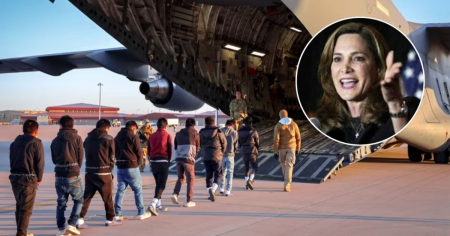A wave of outrage is sweeping across social media following the official notice from the United States government to beneficiaries of humanitarian parole, who must leave the country once their immigration status expires.
Hundreds of Cubans have expressed their frustration, fear, and rejection of the measure, which they see as a low blow to those who entered U.S. territory legally, hoping to rebuild their lives.
“It's not fair, many people already have their jobs, an organized life. They entered legally with a law that the previous president approved, one cannot simply come and erase that.”
"After leaving everything behind and arriving legally, do they now want to throw us out as if we were illegal? This is a betrayal to those who trusted in the system."
"This country cannot change the rules of the game while we are already playing. We are not criminals; we came to work and contribute."
Discontent is directly aimed at the administration of Donald Trump, who recently promoted the cancellation of the humanitarian parole program implemented under the previous administration.
The announcement has been perceived by many as a strategy to discourage legal migration, creating uncertainty for thousands of Cuban families.
"What they are doing is sowing despair. They won’t be able to deport everyone, but in the meantime, they’re leaving them unable to work, without rights. It’s a punishment for entering legally."
"Many sold everything they had in Cuba. They have nowhere to return to. This is inhumane."
Others recalled that they can apply for the Cuban Adjustment Act, but there are also concerns about the waiting times and the risk of becoming irregular before completing the required year and one day.
"Cubans, do not panic. Do not commit crimes. Wait a year and a day, apply on time. Have faith."
"God says not to mistreat the foreigner who comes to your country. Where are the human rights of those they always talk about?"
Indignation has extended beyond the Cuban community. Migrants from other affected countries—such as Haiti, Nicaragua, and Venezuela—have also expressed concern over the cancellation of the program.
What does the official notice from DHS say?
The Department of Homeland Security (DHS) began sending electronic notifications to immigrants benefiting from humanitarian parole this Friday. The document, made public on the social network X by journalist Jennie Taer, requires these individuals to leave the country voluntarily before the expiration date of their conditional freedom.
"You must leave the United States beforehand, but no later than the end date of your probation. Failing to depart on time may have adverse immigration consequences."
DHS warns that those who do not leave the country voluntarily could face expedited removal procedures or deportation proceedings under the Immigration and Nationality Act.
"With the termination of your parole, you may be subject to expedited removal or deportation proceedings, unless you have departed or obtained a legal basis to remain."
Additionally, the revocation of the employment authorization granted under this program has been notified. As of April 24, 2025, the work permit of those who have not yet changed their immigration status will be rendered void.
"The DHS intends to revoke your employment authorization […] because the condition under which it was granted no longer exists."
Finally, the document clarifies that presenting evidence that the beneficiary is still under parole will not stop the revocation of parole nor will it prevent the termination of associated benefits.
Meanwhile, thousands of Cuban migrants—legal residents, workers, and those in the process of adapting—are waiting for a new shift in policies that will determine their future in the United States.
Frequently asked questions about the revocation of humanitarian parole for Cubans in the U.S.
What does the revocation of humanitarian parole mean for Cubans in the United States?
The revocation of humanitarian parole means that Cuban beneficiaries of this program must leave the United States before their status expiration date. Those who do not will face deportation proceedings. Additionally, they will lose their work authorization from April 24, 2025, if they have not changed their immigration status.
How many Cubans will be affected by this measure?
It is estimated that around 26,000 Cubans who entered the United States after March 2024 will be left without legal protection and at risk of deportation, as they do not meet the requirement of one year and one day of residency necessary to qualify for the Cuban Adjustment Act.
What options do Cubans have who have not yet been in the U.S. for a year?
For Cubans who have not yet completed a year of residence in the United States, it is crucial to seek legal advice to consider options such as political asylum if they qualify, or any other legal avenues available to regularize their status before the deadline of April 24, 2025.
What should Cubans who have already applied for the Cuban Adjustment Act do?
Cubans who have already applied for the Cuban Adjustment Act should not be affected by the revocation of humanitarian parole, as long as their application is pending or they have completed the adjustment of status process before the official announcement. It is advisable that they present evidence of their application to avoid penalties.
How does the revocation of humanitarian parole affect sponsors?
The sponsors are relieved of the responsibility they assumed by endorsing the beneficiaries of the humanitarian parole, once the program is revoked. However, they may still receive notifications regarding the immigration status of the individuals they brought to the country.
Filed under:
